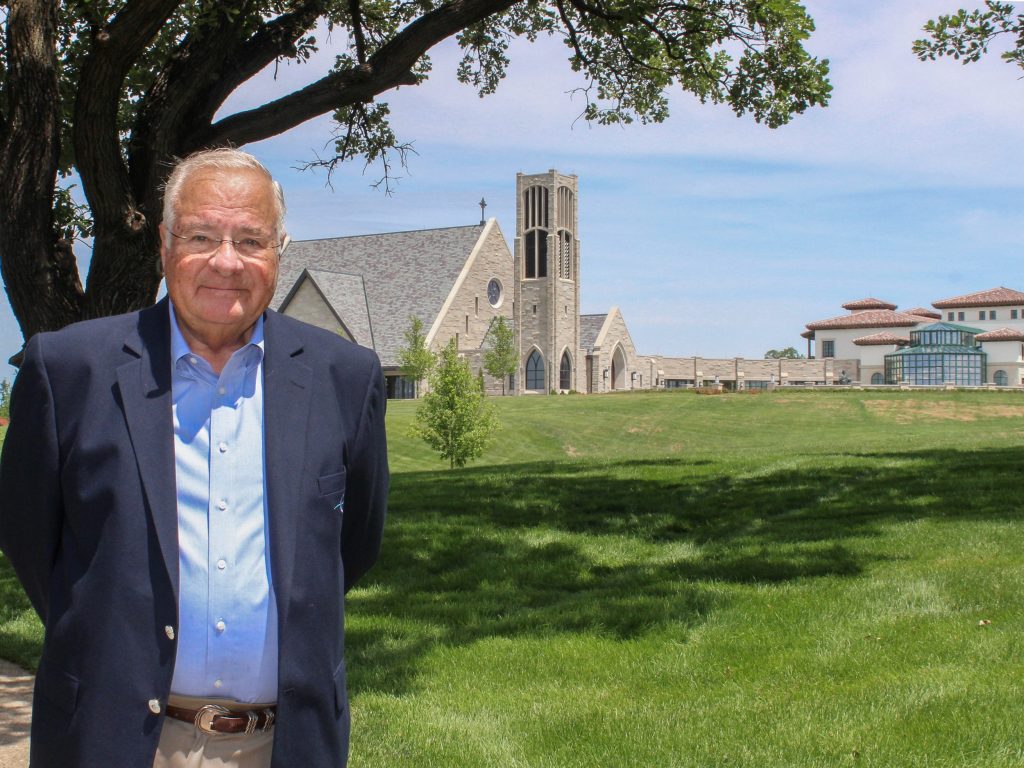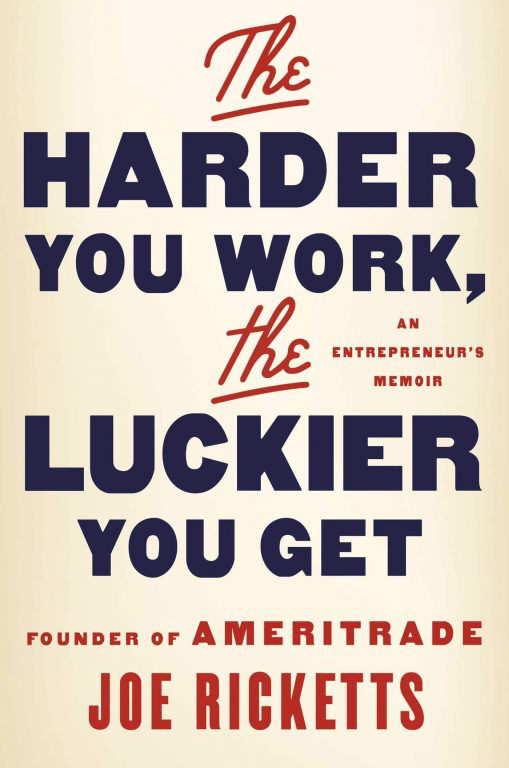
TD Ameritrade Founder Joe Ricketts
By John Jannarone
In an interview with CorpGov, Joe Ricketts relates the long path he took from calling on businesses door-to-door in Nebraska to convincing investors to place trades by telephone to ultimately launching Ameritrade, which would become TD Ameritrade and later this year part of The Charles Schwab Corporation.
CorpGov: Your new book, The Harder You Work, The Luckier You Get, details your spectacular rise from working as a janitor’s assistant at school, to becoming CEO at TD Ameritrade, a $1.3 trillion custodian, and one of America’s largest online brokerage firms. How has corporate governance played a role in your success?
Mr. Ricketts: I always imagined myself in charge of the businesses where I worked. As I left college and took my first full-time job, that dream grew. I wanted my own business to run. But for years, the chance to try seemed out of reach. I had no money to start a business.
I took a job with Dun & Bradstreet where I went out to all the small towns in Southeast Nebraska and Southwest Iowa to call on the businesses. I drove business to business with a credit report that I had from a previous year to talk to those businesses about updating it. Soon after, I would move to Dean Witter as a stockbroker in 1968 and it was there ideas started to generate.
The closest I could get to being a business owner was becoming a stockbroker, paid on commission based on my own ideas and efforts. But I became one at precisely the wrong time. The 1960s had ended and we then had a long bear market when it was very difficult to be successful.
Dean Witter was a commissions job. All the brokers in the country worked on commissions and I didn’t have capital to start my own business. So, this was as close to having my own businesses I could get. And, we happened to become registered at a time when the market was at the top and it went down for the next five years, which was a big surprise because it hadn’t done so for a long time.
And it was through these professional experiences and my experience growing up in Nebraska City that I realized how important integrity was when it came to how you ran your business. And at the center of integrity is effective corporate governance because it’s always easy to do the right thing when the stakes are low, but it’s when the stakes are high that doing the right thing matters most.
CorpGov: What was the big change that led to your success?
Mr. Ricketts: The big change came when the government, which had always regulated the commissions that stockbrokers could charge, decided to allow free negotiation of what the commissions would be. That meant that traditional stockbrokers were going to make even less money for the same effort. But it also meant that it might be possible to start a new kind of brokerage, one that offered a much lower price for a trade. One colleague saw it the same way I did: Why stay at a full-service broker and lose the customers who want a lower price? Why not become the new brokers who get to welcome those customers?
With those restrictions removed, it appeared as though we were going to need to have twice as much of a client book and work twice as hard just to be able to make the same living. My friend, Bob Pearlman, offered to partner with me; I told Bob I had no idea how to start a brokerage firm. We didn’t have any idea whatsoever except there were two things which floated through our minds. Number one was we thought there was a large enough market of people that wanted to buy or sell a stock without any other conversation.
The other idea that was important was that after the second world war, we had the G.I. Bill and a lot of men and women coming back from the war used the G.I. Bill to become professionals, and these people were educated well enough to be able to do their own financial planning and be able to make their own decisions. The market turned out to be huge.
CorpGov: So, how did First Omaha eventually become Ameritrade and then TD Ameritrade?
We thought we would be a local business and found out that we could not exist as one. So, we advertised in the Midwest edition of The Wall Street Journal. There was a favorite spot in those times where all the discount brokers advertised. Something that was unique to us was that Omaha was the location of strategic air command. The federal government, the Air Force, paid Northwestern Bell Telephone Company to put in a sophisticated communication system in case there was a war. But obviously, there wasn’t, and this communication system was ultimately not used. So, the phone company dropped their rates on what was then a brand-new idea, specifically 800 telephone numbers, where the caller did not pay for the telephone call.
And so, our telephone rates for interstate calls, long-distance calls, were anywhere from 10 to 20 percent lower than if we’ve been in any other location in the country. And that was one of our major costs. So, that gave us a cost-benefit we didn’t see when we started as First Omaha but then we did see later after we started advertising in the Midwest edition of the paper.
That was so successful we went to the national edition and then we attracted customers from all over. So, then we really kind of changed the name to First National. The problem we had to overcome was that people were not used to dealing with a broker that they couldn’t see, touch and feel.
CorpGov: Reading from your book, is it correct to say you were one of the first to allow people to use touchtone keys to execute trades?
We were the very first. It meant a customer could call up First National and punch in the stock symbol and punch in how many shares and the trade would go off automatically. Even though it was innovative, the customers didn’t want to use the service at first – I realized I had to make it cheaper to attract their attention.
I came out with a unique way of charging for customers, about three pennies a share. And so, that was something that got through immediately and people would take the five minutes to learn how to use the system. Over a period of time, we were able to buy out many of our competitors.
CorpGov: In 1995, Ameritrade became the first online brokerage. What was that like? Did you have any idea that the internet would replace the whole telephone side of things?
In 1993, nobody knew the Internet. It hadn’t evolved to the point where we are today. We talked to a Manhattan company, K. Aufhauser & Co., that was advertising doing trades online (which nobody had heard of at that time), and I decided to buy it just so I could understand the technology. The industry didn’t understand what we were doing – they didn’t have any foresight of the Internet – and thought we overpaid by a lot.
Six months later however, they finally got it: We had put the economies of scale in place to be able to increase our profits dramatically. There were no APIs like we have today. We had to build all of that, which is good because we learned the hard way, made a lot of mistakes on software that didn’t work, we had to start over and do it again. But by the time we got all that done, a customer could sit at home on their keypad of their own computer. They could place a trade and get a report within seconds. Full online trading and then the exchanges on the over-the-counter market developed systems of receiving those orders electronically, automatically executing them and reporting back.
During this time, our iconic advertising slogan, ‘Let’s light this candle’ became a standard quotation in the securities industry.
CorpGov: The company went public in 1997. What was that like?
The decision to go public wasn’t easy for me. It meant we would no longer be a private business and the entire culture would change. Our governance, which had been less formal, would change. But I realized that online trading was an inflection point in the history of not only the brokerage business but in the history of investing, and if I were going to take advantage of it, I needed more capital to build the technology and advertise.
CorpGov: When did the deal with TD Waterhouse take place?
The merger took place in 2006. What we had done before was buy our competitors. Waterhouse was a big competitor – we had talked to them about merging or buying them. Those talks did not result in anything happening. But what did happen with Waterhouse is Toronto Dominion Bank in Canada bought Waterhouse securities and as the business continued to grow, in market size with everybody having more accounts, we came to understand one thing: size made a difference.
And so, if we could merge or buy a competitor, the better off we were and Waterhouse was one of those people that fit into one of our targets. Now, it was a big change for us because it would take the Ricketts family from owning more than 50 percent to owning less than 50 percent.
But at the end of the day, my approach to Ameritrade was that I needed to make the decisions that were in the best interests of shareholders, so, we merged with the brokerage firm TD Waterhouse. After this, The Toronto-Dominion Bank became the largest shareholder of Ameritrade.
Our volume remained relatively steady. So, with the technology that we had put in place, we had gotten to the point where our volume could come down, our revenues could come down and we can still make a profit. We continued to reduce our costs by adding more technology.
The Harder You Work, the Luckier You Get: An Entrepreneur’s Memoir by Joe Ricketts (Simon & Schuster), is available via Amazon.
CorpGov Contact:
www.CorpGov.com
Twitter: @CorpGovernor






